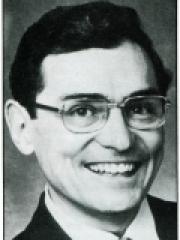Jordan—at the age of 18 the first American ever to win a Rhodes Scholarship for music—was tragically murdered in New York in October of 1982, just after he turned 50 and had been named the Dean of the School of Education at National University in San Diego. The crime remains unsolved.
A well-known guest lecturer at more than 70 universities in the US and abroad, Jordan gave courses, conducted seminars, spoke extensively on his work in psychology and education, and appeared as a guest or panelist on over two hundred television and radio programs, including popular network talk shows such as The Dinah Shore Show and The Mike Douglas Show.
A child prodigy and piano virtuoso at a young age, Jordan earned his Bachelor's and Master’s degrees in the composition, theory and history of music from Oxford University in England, and turned down an offer to play Beethoven's “Emperor's Concerto” with the Oslo Symphony, which would have propelled him onto the tour circuit as a concert pianist. Instead, Jordan radically altered his career direction and began collegiate studies again at the University of Chicago, where he earned a master's degree in human development. In 1964 he obtained a Ph.D. in human development with specialization in social anthropology and psychology. He went on to carry out a post-doctoral sequence in brain structure and brain chemistry and their relation to memory, emotion, and learning.
Jordan’s deep spiritual life affected everything he did. As a Baha'i, Jordan believed in the emergence of a new, universal global culture, which he felt he could best serve and help bring about in his role as an educator. With the creation of the Anisa (Arabic for the Tree of Life) Project—adopted by dozens of school systems during Jordan’s lifetime—he had begun to realize his dream of unleashing human potential. Initially conceptualized and constructed at the University of Massachusetts while Jordan worked there as a professor, the Anisa Educational Model, inspired by the Baha'i teachings and the philosophical work of Alfred North Whitehead, soon grew into a national movement that trained hundreds of educators. When his life prematurely ended, Jordan had just established an accredited master's degree program at National University; a university-based, laboratory school for kindergarten through high school; had contracted with the Association for the World University to develop their curriculum; and had founded the International Center for Human Development, one of his lifelong goals.
“Now that Stanford Libraries will make these records available, we invite scholars to examine thoroughly the philosophical basis of the Anisa Model of education, as well as its comprehensive theory of development, along with the theories of pedagogy, curriculum, evaluation, and administration that derive from that all-embracing philosophy—as a possible breakthrough in not only understanding the essential nature of human beings, but also in rescuing educational practice from the vagaries, uncertainties, and erroneous effects of tradition and opinion,” said Dr. Donald T. Streets. “The Anisa Model progressively moves education onto a sound trajectory of responsible improvement that eventually can warrant education and educational practice justifiably being called a science. I believe that Dan Jordan's contribution to an understanding of human development and its import for education will more than equal the great scholarly contributions of Descartes, Galileo, Einstein, and others who had to fight their way to getting their incredible breakthroughs in knowledge known, understood, and eventually appreciated by humanity.”
Daniel C. Jordan
Presentations by Daniel C. Jordan
What does ANISA mean and how to make sure that Understanding takes place.

